Citizens queue to get free Laba porridge
Source:Xinhua Published: 2013-1-20 8:39:19
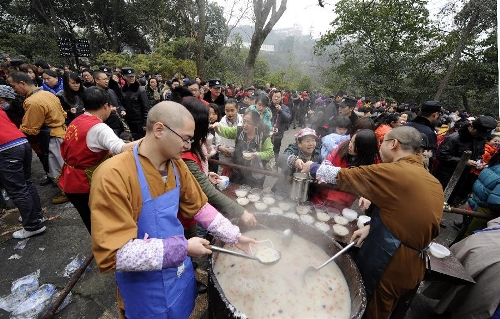
Citizens queue to get free porridge at Huayan Temple in Chongqing, southwest China, January 19, 2013. The Huayan Temple distributed Laba porridge for free on January 19, the eighth day of the 12th lunar month or the day of Laba Festival. The Laba Festival is regarded as a prelude to the Spring Festival, or Chinese Lunar New Year, the most important occasion of family reunion, which falls on February 10 of this year. Drinking Laba porridge on the day of Laba is a traditional custom in China. (Xinhua/Zhou Ke)

A child eats free porridge at White Horse Monastery in Luoyang, central China's Henan Province, January 19, 2013. (Xinhua/Li Bo)
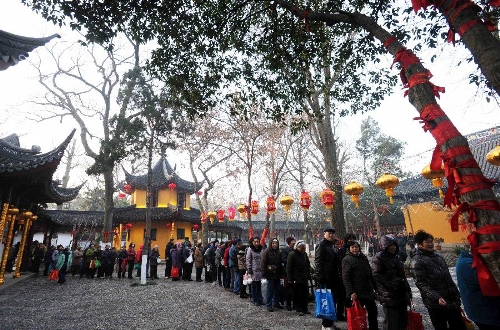
Citizens queue to get free porridge at Hanshan Temple in Suzhou, east China's Jiangsu Province, January 19, 2013. (Xinhua/Hang Xingwei)
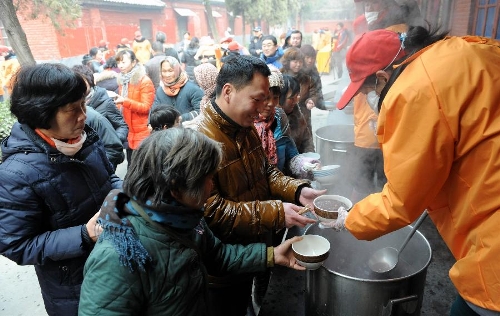
Citizens queue to get free porridge at White Horse Monastery in Luoyang, central China's Henan Province, January 19, 2013. (Xinhua/Li Bo)
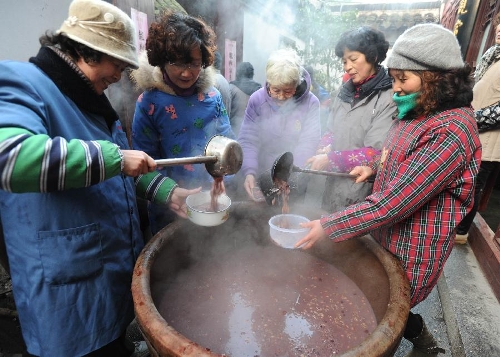
Citizens get free porridge at Hanshan Temple in Suzhou, east China's Jiangsu Province, January 19, 2013. (Xinhua/Hang Xingwei)
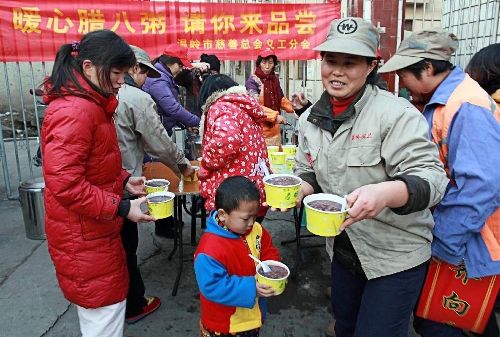
Citizens get free porridge from voluntary workers in Taizhou, east China's Zhejiang Province, January 19, 2013. The Huayan Temple distributed Laba porridge for free on January 19, the eighth day of the 12th lunar month or the day of Laba Festival. The Laba Festival is regarded as a prelude to the Spring Festival, or Chinese Lunar New Year, the most important occasion of family reunion, which falls on February 10 of this year. Drinking Laba porridge on the day of Laba is a traditional custom in China.(Xinhua/Liu Zhenqing)
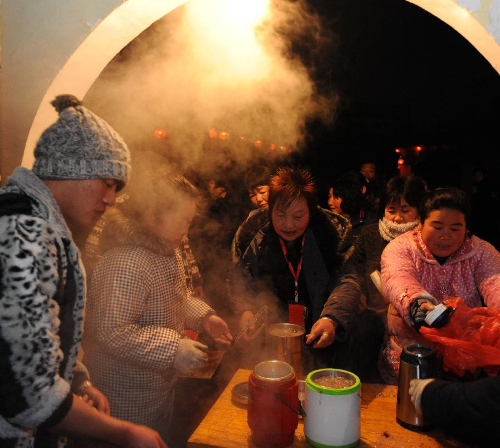
Citizens queue to get free porridge at Baiyi Buddhist Convent in Bozhou, east China's Anhui Province, January 19, 2013. The Baiyi Buddhist Convent distributed Laba porridge for free on January 19, the eighth day of the 12th lunar month or the day of Laba Festival. The Laba Festival is regarded as a prelude to the Spring Festival, or Chinese Lunar New Year, the most important occasion of family reunion, which falls on February 10 of this year. Drinking Laba porridge on the day of Laba is a traditional custom in China. (Xinhua/Zhang Yanlin)
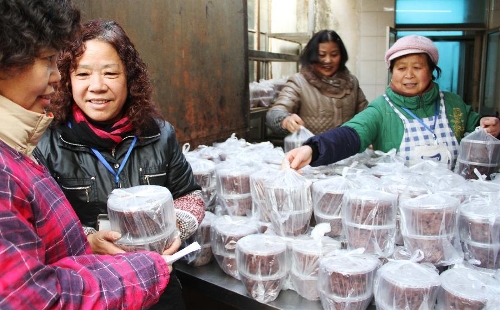
Citizens get free porridge at Xiyuan Temple in Suzhou, east China's Jiangsu Province, January 19, 2013. The Xiyuan Temple distributed Laba porridge for free on January 19, the eighth day of the 12th lunar month or the day of Laba Festival. The Laba Festival is regarded as a prelude to the Spring Festival, or Chinese Lunar New Year, the most important occasion of family reunion, which falls on February 10 of this year. Drinking Laba porridge on the day of Laba is a traditional custom in China. (Xinhua/Zhu Guigen)
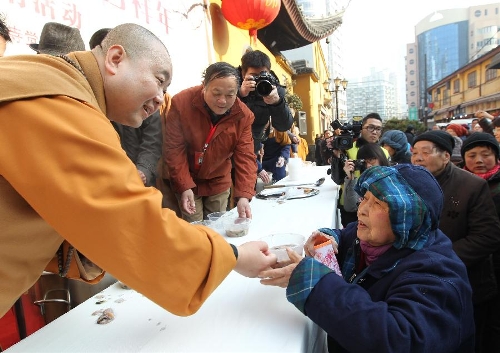
A monk distributes porridge to citizens at the Yufo (Jade Buddha) Monastery in Shanghai, east China, January 19, 2013, to celebrate the traditional Laba Festival. Laba literally means the eighth day of the 12th lunar month. The Laba Festival is regarded as a prelude to the Spring Festival, or Chinese Lunar New Year, the most important occasion of family reunion, which falls on February 10 this year. Eating porridge is an old tradition on the Laba Festival in China. Many temples also have the tradition of offering porridge to the public to commemorate Buddha and deliver his blessings to both believers and non-believers. (Xinhua/Ren Long)
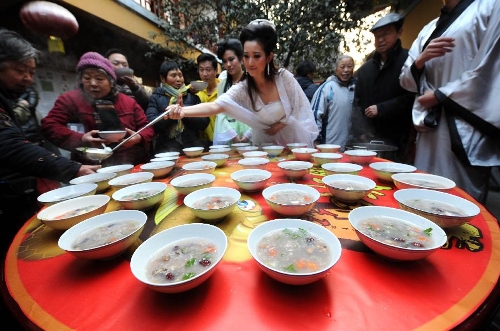
Citizens get porridge distributed by a performer acting as Madame White Snake, a white snake taking on a woman's form in a Chinese folk tale, at the Xuanzang Temple in Nanjing, capital of east China's Jiangsu Province, January 19, 2013, to celebrate the traditional Laba Festival. Laba literally means the eighth day of the 12th lunar month. The Laba Festival is regarded as a prelude to the Spring Festival, or Chinese Lunar New Year, the most important occasion of family reunion, which falls on February 10 this year. Eating porridge is an old tradition on the Laba Festival in China. Many temples also have the tradition of offering porridge to the public to commemorate Buddha and deliver his blessings to both believers and non-believers. (Xinhua/Sun Can)
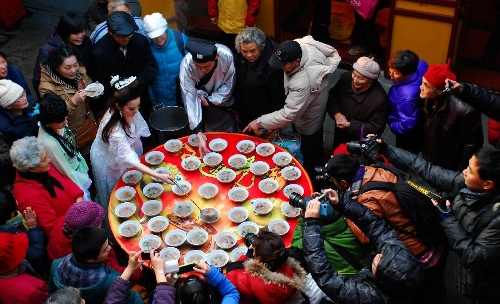
Citizens get porridge distributed by a performer acting as Madame White Snake, a white snake taking on a woman's form in a Chinese folk tale, at the Xuanzang Temple in Nanjing, capital of east China's Jiangsu Province, January 19, 2013, to celebrate the traditional Laba Festival. Laba literally means the eighth day of the 12th lunar month. The Laba Festival is regarded as a prelude to the Spring Festival, or Chinese Lunar New Year, the most important occasion of family reunion, which falls on February 10 this year. Eating porridge is an old tradition on the Laba Festival in China. Many temples also have the tradition of offering porridge to the public to commemorate Buddha and deliver his blessings to both believers and non-believers. (Xinhua/Li Xiang)
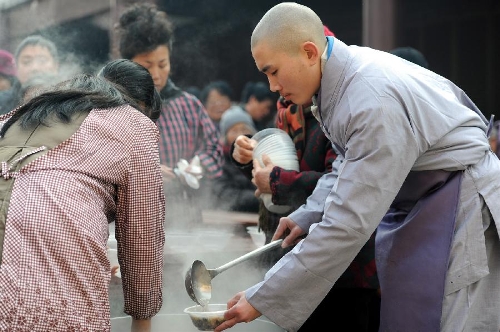
A monk distributes porridge to citizens at the Pilu Temple in Nanjing, capital of east China's Jiangsu Province, January 19, 2013, to celebrate the traditional Laba Festival. Laba literally means the eighth day of the 12th lunar month. The Laba Festival is regarded as a prelude to the Spring Festival, or Chinese Lunar New Year, the most important occasion of family reunion, which falls on February 10 this year. Eating porridge is an old tradition on the Laba Festival in China. Many temples also have the tradition of offering porridge to the public to commemorate Buddha and deliver his blessings to both believers and non-believers. (Xinhua/Han Yuqing)
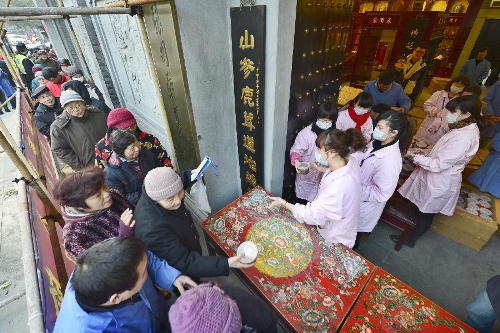
Citizens get free porridge at a Chinese herbal medicine store in Hangzhou, capital of east China's Zhejiang Province, January 19, 2013, to celebrate the traditional Laba Festival. Laba literally means the eighth day of the 12th lunar month. The Laba Festival is regarded as a prelude to the Spring Festival, or Chinese Lunar New Year, the most important occasion of family reunion, which falls on Feb. 10 this year. Eating porridge is an old tradition on the Laba Festival in China. (Xinhua/Li Zhong)
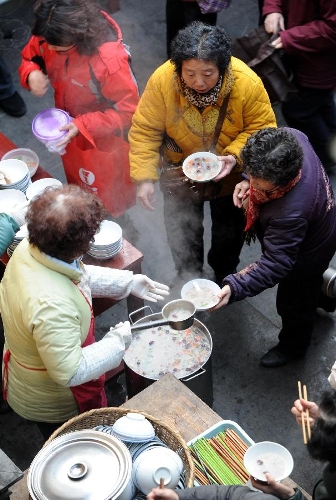
Citizens get porridge at the Xuanzang Temple in Nanjing, capital of east China's Jiangsu Province, January 19, 2013, to celebrate the traditional Laba Festival. Laba literally means the eighth day of the 12th lunar month. The Laba Festival is regarded as a prelude to the Spring Festival, or Chinese Lunar New Year, the most important occasion of family reunion, which falls on Feb. 10 this year. Eating porridge is an old tradition on the Laba Festival in China. Many temples also have the tradition of offering porridge to the public to commemorate Buddha and deliver his blessings to both believers and non-believers. (Xinhua/Sun Can)
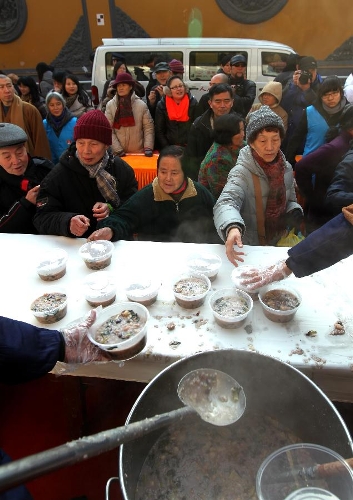
Citizens get porridge at the Yufo (Jade Buddha) Monastery in Shanghai, east China, January 19, 2013, to celebrate the traditional Laba Festival. Laba literally means the eighth day of the 12th lunar month. The Laba Festival is regarded as a prelude to the Spring Festival, or Chinese Lunar New Year, the most important occasion of family reunion, which falls on February 10 this year. Eating porridge is an old tradition on the Laba Festival in China. Many temples also have the tradition of offering porridge to the public to commemorate Buddha and deliver his blessings to both believers and non-believers. (Xinhua/Ren Long)
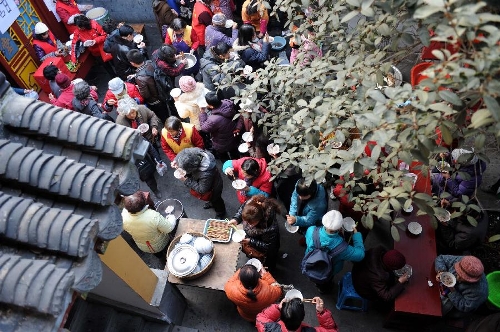
Citizens eat porridge at the Xuanzang Temple in Nanjing, capital of east China's Jiangsu Province, January 19, 2013, to celebrate the traditional Laba Festival. Laba literally means the eighth day of the 12th lunar month. The Laba Festival is regarded as a prelude to the Spring Festival, or Chinese Lunar New Year, the most important occasion of family reunion, which falls on February 10 this year. Eating porridge is an old tradition on the Laba Festival in China. Many temples also have the tradition of offering porridge to the public to commemorate Buddha and deliver his blessings to both believers and non-believers. (Xinhua/Sun Can)
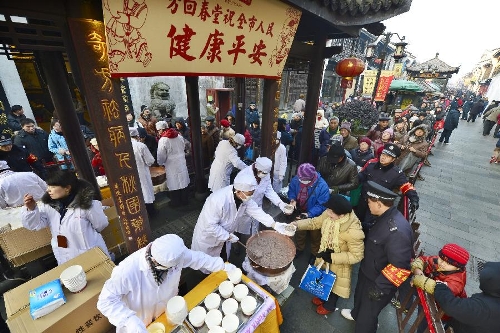
Citizens get free porridge at a Chinese herbal medicine store in Hangzhou, capital of east China's Zhejiang Province, January 19, 2013, to celebrate the traditional Laba Festival. Laba literally means the eighth day of the 12th lunar month. The Laba Festival is regarded as a prelude to the Spring Festival, or Chinese Lunar New Year, the most important occasion of family reunion, which falls on February 10 this year. Eating porridge is an old tradition on the Laba Festival in China. (Xinhua/Li Zhong)
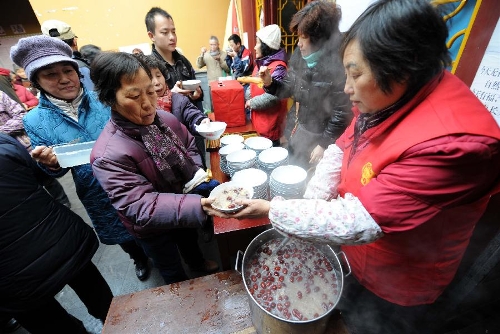
Citizens get porridge at the Xuanzang Temple in Nanjing, capital of east China's Jiangsu Province, January 19, 2013, to celebrate the traditional Laba Festival. Laba literally means the eighth day of the 12th lunar month. The Laba Festival is regarded as a prelude to the Spring Festival, or Chinese Lunar New Year, the most important occasion of family reunion, which falls on February 10 this year. Eating porridge is an old tradition on the Laba Festival in China. Many temples also have the tradition of offering porridge to the public to commemorate Buddha and deliver his blessings to both believers and non-believers. (Xinhua/Sun Can)
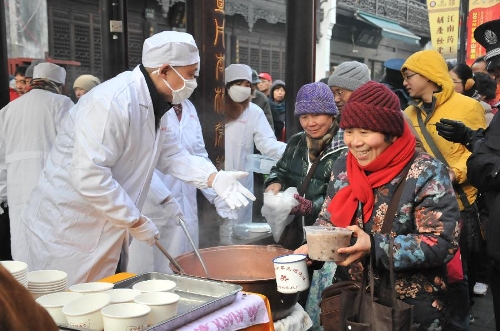
Citizens get free porridge at a Chinese herbal medicine store in Hangzhou, capital of east China's Zhejiang Province, January 19, 2013, to celebrate the traditional Laba Festival. Laba literally means the eighth day of the 12th lunar month. The Laba Festival is regarded as a prelude to the Spring Festival, or Chinese Lunar New Year, the most important occasion of family reunion, which falls on February 10 this year. Eating porridge is an old tradition on the Laba Festival in China. (Xinhua/Li Zhong)
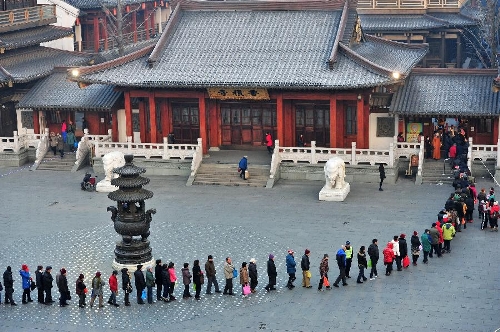
Citizens queue up to get porridge at the Xiangji Temple in Hangzhou, capital of east China's Zhejiang Province, January 19, 2013, on the occasion of the traditional Laba Festival. Laba literally means the eighth day of the 12th lunar month. The Laba Festival is regarded as a prelude to the Spring Festival, or Chinese Lunar New Year, the most important occasion of family reunion, which falls on February 10 this year. Eating porridge is an old tradition on the Laba Festival in China. Many temples also have the tradition of offering porridge to the public to commemorate Buddha and deliver his blessings to both believers and non-believers. (Xinhua/Xu Hui)